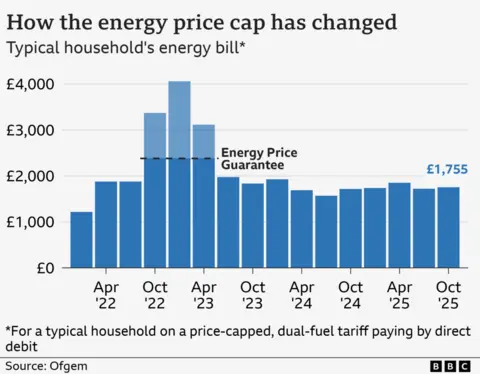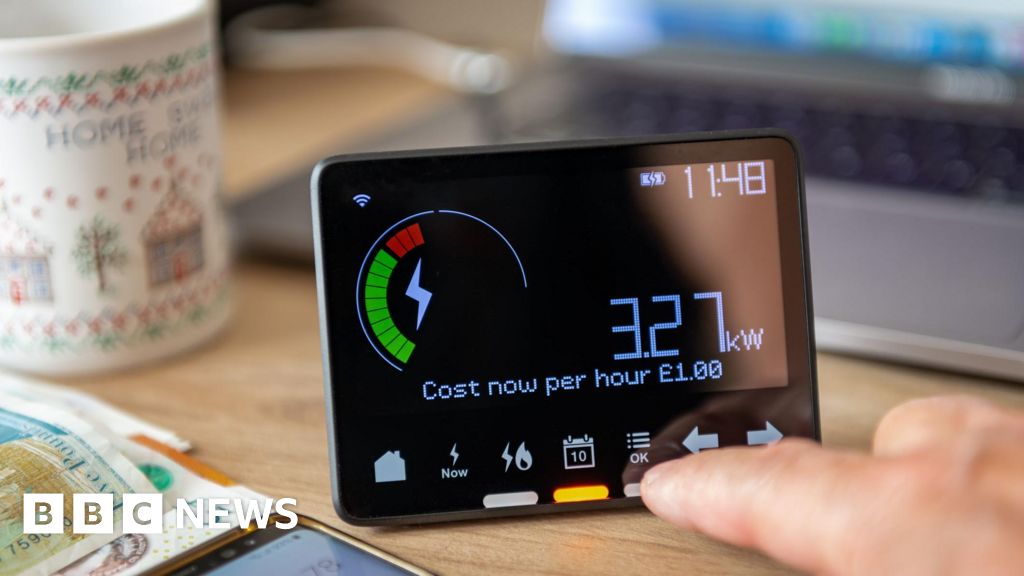Kevin PeacheyCost of living correspondent and
Joshua NevettPolitical reporter
 Getty Images
Getty ImagesEnergy bosses have given a cool reception to regulator Ofgem’s plan to overhaul standing charges.
Under Ofgem’s plans announced in September, all suppliers in England, Scotland and Wales will offer at least one tariff in which standing charges are lower but customers then pay more for each unit of energy used.
But appearing before a committee of MPs, the chief executives and senior management of the UK’s biggest suppliers questioned the outcome of such a move.
Some called for the abolition of standing charges, while others say the proposals would make the issue worse for customers.
Rachel Fletcher, director of regulation and economics at the UK’s largest supplier Octopus Energy, said: “I think a lot of the concern about standing charges is just that people can’t afford to pay their bill.
“Where Ofgem is going is not going to solve any problems, it could make things worse.”
The bosses, giving evidence to the Energy Security and Net Zero Committee, pointed out that the major problem for some customers is that the cost of energy was unaffordable, and some could make the wrong choice when choosing tariffs with low standing charges.
Many called for a social tariff, in which those who are on low incomes receive a discount which is likely to be paid for by other billpayers.
Energy UK, which represents suppliers, recently called for “enduring” government support for those struggling to pay their bills.
Ministers have pointed to the extension of the Warm Home Discount to those on benefits, which knocks £150 off winter bills for one in five households. It is funded by a rise for all billpayers.
Ofgem’s price cap, which sets a maximum price per unit of energy for millions of people in England, Scotland and Wales who are on variable tariffs, rose by 2% in October.
The amount owed to energy suppliers by customers has already increased to a new record high of £4.4bn.
The data, which covers the period from April to June, shows that more than one million households have no arrangement to repay their debt, also a record high.

At the hearing, Simone Rossi, chief executive of EDF UK, was among the bosses who told MPs asking about the climate challenge that the price of electricity compared with a gas was a disincentive to customers wanting to go electric. It was also expensive in the UK compared with other countries.
On Tuesday, Energy Secretary Ed Miliband told the BBC shifting green levies from electricity bills to gas was one option being considered to lower energy costs for households.
But Miliband said no decisions had been made and insisted he would not change energy policy costs “in a way that damages the finances of ordinary people”.
While rebalancing energy policy costs could lower electricity bills, it could increase them for householders using gas boilers.
When asked if the rebalancing of energy bills was being reviewed by the UK government, Miliband said: “We’ve always said we will look at ways of lowering bills for people and that’s obviously one of the options.
“I just want to say on that, we will only ever do that in a way that’s fair and genuinely reduces bills for people.”
‘Fair’ bills
Policy costs are effectively government taxes used to fund environmental and social schemes, such as subsidies for renewables.
These costs made up about 16% of an electricity bill and 6% of a gas bill last year, according to research by the charity Nesta.
The Climate Change Committee has long recommended removing policy costs from electricity bills to help people feel the benefits of net-zero transition.
The government’s climate adviser said the move would make switching to electric technologies, such as heat pumps, cheaper and encourage take-up.
One option – backed by Energy UK – is shifting policy costs from electricity bills to gas.
Energy UK analysis shows that over 15 years, households using an air source heat pump, which is an electrically powered system, could save up to £7,000, compared to those with gas boilers, if energy bills were fully rebalanced.
But such a move would result in an increase in bills for households that use gas for heating.
When asked if that was one option the government was considering, Miliband said: “I’m not going to get into any of the detail of this.
“All I am saying is I’ve always said I’m cautious about this issue because fairness is my watchword.
“So if we can do it in a way that’s fair, that’s obviously something we’re seriously looking at.
“But no decisions have been made on that. I’m not going to do it in a way that damages the finances of ordinary people.”
At the committee, Chris O’Shea, chief executive of Centrica, said this would be a subsidy from the poor to the rich.






